- Teacher of Spanish at Oxford Academy, Advanced Placement (Language) & all other levels
- Vice President of Media/Communications, Foreign Language Association of Orange County (FLA-OC)
- Member of UCI Foreign Language Project COACH (Teachers Coaching Teachers)
- Life-Long Learner
-
Masters in Information Technology (MIT), AIU-Online, 2003-2004
-
Courses: Information Systems, Enterprise and Network Design, Object-Oriented Programming, Database Design and Implementation, Introduction to Information Security, Cryptography Concepts, Special Topics in Network Security, and Strategic Information Management
Professional Clear Credential, California State University at Fullerton, 2004
Preliminary Credential, CSUF, 1999
-
Single Subject: Spanish
Study Abroad in Seville, Spain, The Center for Cross-Cultural Study, 1998
-
Summer Session II (3-week course, extended to 6 for a European vacation - backpacking through England, France, Spain, Belgium, Italy, and what was Yugoslavia with my sister)
Courses: Al-Andalus: Art And Culture Of Muslim Spain; Flamenco dance with Juana Amaya (unrelated to CCCS)
Bachelor of Arts in Spanish, University of California at Irvine, 1993-1997
-
Emphasis: Bilingualism and English as a Second Language
Member of Sigma Delta Pi (National Collegiate Hispanic Honor Society), Xi Tau Chapter
Study Abroad in Mérida, Venezuela, VENUSA, July 1996 - January 1997
Fall Semester [4 months of courses in Mérida at VENUSA (the only institute in Venezuela that was WASC-accredited at the time), extended to a 6-month stay thanks to the Bravo Pérez family from Maracaibo with whom I spent the first and last months]
- UCI IOP Program through the University of Minnesota (I was the 2nd UCI student ever to study abroad in Venezuela at that time!)
Courses: Spanish Composition & Conversation, Advanced Spanish Grammar, Caribbean & Hispanic American Literature, and Culture & Civilization of Latin America and Venezuela
Work Experience: Teaching English as a Second Language at Fundación Don Bosco, and teaching Flamenco dance classes (sevillanas y rumbas) at the neighborhood recreational facility
-
Fluent in English and Spanish
Native Serbo-Croatian (can read, write, and speak at intermediate level)
Russian and Italian (can read, write, and speak at basic level)
-
Teacher of Spanish, 1999-present
- Oxford Academy, AUHSD
Courses Taught: Spanish B/I, Spanish II, Spanish III, a Spanish IV/AP combination class, and Spanish AP Language
Extracurricular Activities on-campus: BTSA Beginning Teacher, School Site Council Teacher Representative, Intramural Girls' Volleyball Coach, Academic Pentathlon/Decathlon Coach, Character Education Coordinator, Character Education Officers (CEOs) Advisor, International Dance Club Advisor & Choreographer, Senior Class Advisor (2004-05), Anaheim Secondary Teacher Association (ASTA) Site Representative
Extracurricular Activities off-campus: VP of Media for the Foreign Language Association of Orange County (FLA-OC), member of UCI Foreign Language Project COACH (Teachers Coaching Teachers)
Teacher of English Language Development (ELD), July/August 2005
- Trident Education Center, AUHSD
Courses: Intermediate ELD for Adults, evening classes
Teacher of English Language Development (ELD), July/August 2004
- Magnolia High School, AUHSD
Courses: Intermediate ELD, second session
Student Teacher of Spanish & ELD, 1998-1999
- Valencia High School, PYLUSD
Master Teachers: María Ethington and Clara Rodríguez-Creger
Courses: Spanish I and ELD 1A
Electronic Educational Environment (EEE) Faculty Support, 1997-1998
Response Center/Help Desk/Laboratory Consultant, 1994-1996
Network and Computing Services (NACS)
[formerly known as the Office of Academic Computing (OAC)
PUBLICATIONS:
- FL Lip-Sync Karaoke Contest!
- Lesson Plan on EducationWorld.com, published in February 2006.
- Smack It!
- Tip for vocabulary review, from the Works4Me Tips Library at www.nea.org (National Education Association)
- ¿Qué te gustaría hacer?
- Interactive games on Quia.com ("the web's largest learning resource")
- ¡Tarjetas postales!
- Tip for a project on the Educator's Reference Desk site
- Foreign Language Association of Orange County Web Site
- Content pages include these: Contact Info, Membership, Events Calendar, Meeting Minutes, Immersion Camps, Language Links, "THE ZEST!" Newsletter, OC Job Openings, Teaching Tips, Awards & Recognition, Student Spotlight, Professional Development, and other special foreign language events
- FLA-OC Newsletter "THE ZEST!"
- Available in hard copy to current members of FLA-OC
- COACH Kickoff (August 25, 2005 - Costa Mesa Community Center)
- FLA-OC Fall Workshop: “Play It Again, Ma’am”: Entertaining Activities to Teach all Four Skills and Motivators to Keep Students Speaking in the Target Language with Cynthia Leathers, CLTA Teacher of the Year (Saturday, October 16, 2004 - Costa Mesa, CA)
- COACH Kickoff (August 26, 2004 - Costa Mesa Community Center)
- AUHSD World Language Curriculum Development (January? 2004 - La Palma)
- The College Board & AP Program's 2002 Summer Institute: "AP By the Sea" (July 7-12 @ University of San Diego)
- Golden State Exam Scoring Session (July, 2002 - Los Alamitos HS, CA)
- AUHSD World Language Curriculum Development (June 17-20, 2002 - La Palma, CA)
- CLTA (CA Language Teachers' Association) Conference (April 19-21, 2002 - Long Beach)
- Golden State Exam Scoring Session (July 9-13, 2001 - Oxford Academy Professional Development Center, Cypress)
- AUHSD World Language Curriculum Development (June 18-22, 2001 - La Palma)
- The College Board AP Spanish Workshop (December 2, 2000 - University HS, Irvine)
- Vision 20/20 Project Based Learning (August 17-21, 2000 - Fountain Valley)
- AATSP Annual Meeting (August 2-6, 2000 - San Juan, Puerto Rico, USA)
- AUHSD World Language Curriculum Development (June 19-23, 2000 - La Palma)
- The College Board AP Spanish Workshop (March 18, 2000 - North HS, Riverside)
- CATESOL sponsored, "Using Music to Enhance L2 Acquisition" (October 27, 1998 - Chapman College)
- UCI Foreign Language Project COACH (headed by Suzanne Charlton, formerly associated with the CA Foreign Language Project), inducted June 4, 2005!
- FLA-OC - Foreign Language Association of Orange County (local affiliate of CLTA), 1999-present
- CLTA - California Language Teachers Association, 1999-2002 & 2005-2006
- AATSP - American Association of Teachers of Spanish & Portuguese, 1999-2001
- CATESOL - California Teachers of English to Speakers of Other Languages, 1999-2001
- NGS - National Geographic Society, 1999-2001
- Presenter @ Taller AP en el Colegio de Esperanza de Anaheim, April 30, 2005
...colocaré más detalles cuando tenga tiempo para publicarlos. - Presenter & Presider @ the CLTA Conference, Ontario (2005)
- Workshop Title: "Music and Dance ¡en español!"
(Three-Hour Pre-Conference Workshop, Friday, April 15, 3:30 - 6:30 pm)
Descripion: "Get energized with culturally authentic dances from Latin America and Spain! Focus: Sevillanas/Flamenco/Salsa/Cumbia/Merengue & also ideas for using music for grammar/debates/lip sync/etc.! Si puedes andar, ¡ya sabes bailar!"
 One workshop highlight for me was when I taught the group a Serbian Kolo ("Ti si me cekala/Rujno vino" - Tozovac - click on purple music note for entire song & best sound) using the Serbian language to illustrate how the linguistically weak student feels in a dance class - a bit chaotic, but easy to follow as long as movement is large and lots of body language is used. The teachers of Spanish who attended my workshop learned many phrases in Serbian after the 5-minute immersion experience (opet - otra vez, jedan/dva/tri/itd. - uno/dos/tres/etc., veliko/malo - grande/pequeño, ruke/noge - manos/piernas, and more), to their surprise (all but one attendee, who introduced herself as Serbo-Croatian, to my pleasant surprise)! The main goals to remember when teaching dance are to enjoy (we don't do this enough in schools today, and it is key for motivating students to go on with foreign language study), to focus on learning (a variety of things: rhythm & melody, instrumentalization, culture, history, geography), and to remember to always respect others (especially important when teaching dance or any movement to adolescents, and when sharing cultural information with an ethnically diverse audience). The foreign nature of this Eastern European cultural practice was ideal for the Spanish teachers, many of whom were of Latin descent; it reminded them of (or introduced them to) what it feels like to be a student in a foreign language classroom, and to be unfamiliar with both the target culture and language. It also was a good reminder of how much students learn by example, and how important it is to use the target language as much as possible - even in beginning level classes.
One workshop highlight for me was when I taught the group a Serbian Kolo ("Ti si me cekala/Rujno vino" - Tozovac - click on purple music note for entire song & best sound) using the Serbian language to illustrate how the linguistically weak student feels in a dance class - a bit chaotic, but easy to follow as long as movement is large and lots of body language is used. The teachers of Spanish who attended my workshop learned many phrases in Serbian after the 5-minute immersion experience (opet - otra vez, jedan/dva/tri/itd. - uno/dos/tres/etc., veliko/malo - grande/pequeño, ruke/noge - manos/piernas, and more), to their surprise (all but one attendee, who introduced herself as Serbo-Croatian, to my pleasant surprise)! The main goals to remember when teaching dance are to enjoy (we don't do this enough in schools today, and it is key for motivating students to go on with foreign language study), to focus on learning (a variety of things: rhythm & melody, instrumentalization, culture, history, geography), and to remember to always respect others (especially important when teaching dance or any movement to adolescents, and when sharing cultural information with an ethnically diverse audience). The foreign nature of this Eastern European cultural practice was ideal for the Spanish teachers, many of whom were of Latin descent; it reminded them of (or introduced them to) what it feels like to be a student in a foreign language classroom, and to be unfamiliar with both the target culture and language. It also was a good reminder of how much students learn by example, and how important it is to use the target language as much as possible - even in beginning level classes.
- Presided for the following interest sessions:
- "Suavemente - Teach Your Upper Levels with Cool and Appropriate Music" - Saturday 8-9 am
Lonnie Dai Zovi, Vibrante Press (lonnie@vibrante.com) - "Make it Real! Integrating Language and Culture in the Spanish Classroom" - Saturday 9:30-10:30 am
Rich Sayers, Senior National Consultant, Modern & Classical Languages, Prentice Hall (rich.sayers@phschool.com) - "Dancing Through the Empire: Fighting Back with Movement (Part 1: Chachachá)" - Saturday 2:30-3:30 pm
Joseph Micaletti (retired FL Teacher, no contact info given) - "Addressing 'Community': Expanding Community Boundaries" - Saturday 4:15-5:15 pm
Akiko Soda, Teacher of Japanese at Mills High School (asoda@smuhsd.k12.ca.us)
- "Suavemente - Teach Your Upper Levels with Cool and Appropriate Music" - Saturday 8-9 am
- Workshop Title: "Music and Dance ¡en español!"
- Create and maintain FLA-OC website
- Edit and produce quarterly newsletter, "The Zest!"
- Assist with Board responsibilities
- This is a course I developed and taught through Cypress College Extension for Oxford students interested in preparing themselves for the following college entrance exams: Spanish AP Language and SATII: Spanish. Approximately 20 students were enrolled in the course, and we met for 2-3 hours per session.
- Attend all planning meetings
- Assist with camp responsibilities, including teaching workshops for small and large groups and providing music for activities and singing
- Received training for scoring essays with 4-point GSE rubric
- Scored countless essays during 40-hour work week
- OA PTSA Honorary Service Award, February 2005
- Who's Who Among America's High School Teachers, 2004 y 2005
¡Gracias a Ruth "Carmencita" Cervantes en el 2004, y a alguien anónimo este año! - OA Teacher of the Month, February 2000
-
Available upon request



¡LaTina!...mas no latina.

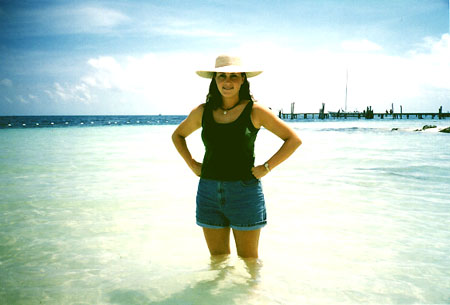
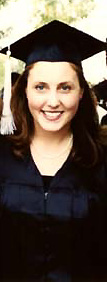
(De izquierda a derecha) Bailando sevillanas con el UCI Dance Ensemble en el parque Aldrich en el Festival Anual de Wayzgoose,
la "Casa Abierta" de UCI (1995); de vacaciones en las aguas cristalinas y tibias de Cancún, México (1997); y en toga y birrete
en el día de la graduación de UCI, como Licenciada en español (1997). (Abajo) Bailando kolo (el baile folklórico serbio) en la
Asamblea Internacional (25/III/05) con la Sra. Diane Erickson (antes de casarse se llamaba Danica Milinovich),
mi madrina de boda (Kuma) y también gran amiga y admirada colega en la Academia de Oxford - ella es maestra de inglés.
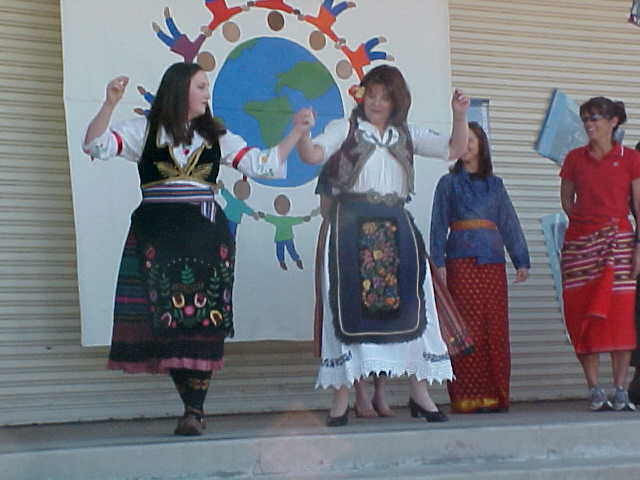



Preguntas frecuentes [ENGLISH!]
He ido dos veces a la ex-Yugoslavia de viaje para conocer y convivir con mis parientes de ambos lados de mi familia (materno y paterno), pero mi familia más cercana (padres, hermanas, abuelas, tíos, primos hermanos) vive en varias partes de los EE.UU. Ya por más de 30 años, sólo la familia extendida vive en ese país del este de Europa (el mapa político de abajo es del año 1996 - pulse sobre el para agrandarlo). Para aprender más sobre Serbia, mire estos enlaces:
Mi apellido es ahora y siempre ha sido Matić. Mucha gente cree que mi apellido se escribe Maddock o Maddick cuando se pronuncia a lo gringo. Al pronunciarlo bien, es una combinación de dos palabras inglesas: MA ("madre", o "mami") y teach ("profe", es decir "profesor" abreviado). Irónicamente, una es mi meta y la otra es mi profesión... así que no debe ser tan difícil de pronunciar. Sin embargo, siendo la tercera hija en mi familia, ya la pronunciación de Maddick fue establecida mucho antes de que yo llegara al colegio así que era difícil de evitar. Hasta tuve un lema en la primaria cuando me lancé en las elecciones de gobierno estudiantil: "Don't give me no static, vote for Tina Matic!" (o sea, "no me causen problemas..." -en jerga californiana adolescente de la época de los años 80- "...y voten por la máquina").
Cuando llegué a la universidad y encontré a gente más culturalmente sabia, no había ningún problema en enseñarles la pronunciación correcta de mi apellido desde el primer momento en que lo pronuncié. Al salir de la UCI y entrar en la CSUF, de nuevo encontré problemas con algunos que no podían pronunciarlo bien. Y al empezar mi trabajo en la Academia de Oxford, había maestros que me conocían desde el colegio porque eran mis maestros en esos años en Kennedy HS y empezaron a llamarme por el erróneo e inevitable Maddick... hasta que me casé unos años después. Los que me preguntaron cuál iba a ser mi nuevo apellido se confundieron por un momento cuando les dije "MA-teach"... pero creo que por fin entendieron que mi insistencia no iba a disminuir. Dentro de mi clase con mis alumnos, no hay problema. Pero algunos todavía se confunden y lo pronuncian con el énfasis cambiado (ma-TEECH), y/o con sonidos distintos (ma-TEESH)... pero bueno... no me molesta tanto, y es problema de ellos. Me alegro de que la mayoría de mis alumnos sepa la diferencia.
El deletreo de mi apellido es el original de Serbia, sin añadir una "h" al final como mucha gente hizo al entrar a los EEUU en la Isla de Ellis para el beneficio de quienes no pudieron pronunciar sus apellidos bien. El deletreo del apellido de mi esposo es Espinosa, con dos eses. Mucha gente en el sur de California lo escribe con una zeta al final, al estilo azteca-mexicano, lo cual siempre lleva a la explicación de que mi esposo es colombiano y allá (como en la mayoría del mundo hispanohablante) se escribe con dos eses. Sólo los latinos suelen recibir esta explicación porque los demás no saben ni les importa la diferencia. Mi esposo estaba de acuerdo con la idea de yo mantener mi apellido serbio, ya que la costumbre latina dicta que la mujer casada no cambie su apellido sino que añada "de" más el de su esposo, como hizo su madre (mi suegra) Ruth Herrera de Espinosa... es decir, que yo me llamaría Tina Matic de Espinosa, si fuera a cambiarlo al estilo latino. Pero como a mi esposo no le importaba que lo cambiara y como mi padre no tuvo hijo para mantener el apellido de la familia, yo decidí quedarme con el mío. Así, además, ningún alumno se engaña al entrar en mi salón de clase y pensar que soy latina, cuando no lo soy... mejor dicho, soy ¡La Tina!
...y éste es el ruso, para poderlos comparar visualmente:
Además de mejorar mi dominio del serbio, me gustaría aprender el portugués también.
Cuando llegó la hora de escoger mi especialización en la UCI, el español era la opción más práctica y obvia porque era la única materia académica que me gustaba y en la que mejor salía. Así que mientras sacaba mi licenciatura con una especialización en "Spanish: Bilingualism and ESL", pude pasar 6 meses en Venezuela estudiando y trabajando en el extranjero durante mi tercer año como "osa hormiguera" en la UCI. Esa experiencia solidificó mi español oral (y me dio un fuerte acento venezolano, el cual me fascinaba), y por fin pude hablarlo con completa seguridad.
Busqué y por fin encontré una clase de jazz para principiantes, y me matriculé en ella. Me gustó, pero era mucho trabajo. No tenía ni la flexibilidad ni la fuerza suficientes para poder bailar en ese estilo con el éxito que quería tener. Después de un año de eso, cambié a Spanish Dance. Escogí ese tipo de baile porque creía que mientras hacía ejercicio iba a poder aprender más sobre las culturas del mundo hispano y eso me ayudaría en mi especialización.
Resulta que sí, fue directamente relacionado a mi especialización, y fue muy divertido también. Así empezó mi carrera ilustre como "LaTina" (mas no latina), bailaora de flamenco. He bailado en la UCI con la Dra. Nancy Ruyter, en la OCC con Lilia Lloréns, en Cypress College con Liliana de León-Torsiello, en Chapman College y en Concordia University. Bailé en el restaurante Tapas de Newport Beach con UCI Spanish Dance Ensemble y también internacionalmente en Mérida (Venezuela) dando clases a niñas de entre 8 y 14 años de edad, y en Sevilla (España) bajo la dirección de Juana Amaya. El flamenco es una de mis pasiones en la vida.
En cuanto a otros bailes latinos populares, la salsa, la cumbia colombiana y el merengue dominicano los aprendí en Los Ángeles, los mejoré en Venezuela, y los sigo disfrutando local e internacionalmente con mi esposo colombiano. El tango argentino aún no lo sé bailar, pero me gustaría aprenderlo - ¡es que me parece muy difícil! Tengo que tomar clases, y un buen día de éstos lo haré.
I have been to the former Yugoslavia twice on vacation and to meet and stay with relatives from both sides (maternal and paternal), but my closest family (parents, sisters, grandmothers, uncles, cousins) live in various parts of the U.S. For more than 30 years now, only our extended family lives in that Eastern European country (the political map below is from 1996 - click on it to enlarge it). To learn more about Serbia, see these links:
My last name is now and has always been Matić. Many people think my last name is written Maddock or Maddick when it's pronounced by an English-speaking monolingual. When pronounced correctly, it's a combination of two English words: "MA" and "teach". Ironically, one is my goal and the other is my profession... so it shouldn't be that hard to pronounce. However, being the third daughter in my family, the Maddick pronunciation was well-established long before I arrived at high school so it was difficult to avoid. I even had a slogan in elementary school when I ran for student government: "Don't give me no static, vote for Tina Matic!" (it rhymed... not much else does).
When I got to the university and started meeting people who were more culturally aware, I had no problem teaching others the correct pronunciation of my last name from the moment I met them. When I left UCI and entered CSUF, I met many people (yet again) who couldn't pronounce it well. And when I started my job teaching at Oxford, there were teachers who knew me from high school because they were my teachers in those years at Kennedy HS, so they started to call me by the erroneous and inevitable Maddick... until I got married a couple of years later. Those who asked me what my new last name was going to be were a bit confused at first when I told them "MA-teach"... but after a while I think many of them realized that I was not going to stop insisting on the correct pronunciation. In class with my students, there's no problem. But some still are confused and pronounce it with an emphasis change (ma-TEECH), and/or with different phonemic sounds (ma-TEESH)... but heck... it doesn't bother me that much, and it's their problem. I'm happy that the majority of my students know the difference.
The spelling of my last name is the original one from Serbia, without adding an "h" at the end like many people did when they came to the US via Ellis Island to benefit those who couldn't pronounce their last names well. The spelling of my husband's last name is Espinosa, with two "s"s. A lot of people in Southern California spell it with a Z at the end, Aztec/Mexican style, which always prompts the explanation that my husband is Colombian and there (as in most of the Spanish-speaking world) it's spelled with two "s"s. Only Latinos get this explanation because others don't seem to know or care about the difference. My husband agreed with the idea of me maintaining my Serbian last name, since the Latino custom dictates that the wife not change her maiden name but rather add "de" plus her husband's name, like his mom (my mother-in-law) Ruth Herrera de Espinosa did... so, I would call myself Tina Matic de Espinosa, if I were to change it to Latino-style. But since it didn't matter to my husband and since my father had no sons, I decided to keep my last name. Also, that way my students aren't confused when they enter my classroom expecting to see a Latina teacher... since I'm not... though I am still La Tina!
...and this is the Russian one, so you can compare visually:
Besides improving my command of Serbian, I'd also like to learn Portuguese.
When the time came to choose my major at UCI, Spanish was the most practical and obvious choice because it was the only academic subject that I enjoyed and the one in which I had had the most success. So while getting my bachelor's degree in "Spanish: Bilingualism and ESL", I was able to spend 6 months in Venezuela studying and working abroad during my 3rd year as an "anteater" at UCI. That experience solidified my oral Spanish (and gave me a strong Venezuelan accent, which I absolutely loved), and I was finally able to speak with complete confidence.
I looked for and found a beginning jazz class, and I signed up for it. I liked it, but it was a lot of work. I didn't have enough flexibility or strength to dance that style of dance as well as I would have liked to. After a year of that, I changed to Spanish Dance. I chose it because I thought that while doing exercise I would be able to learn more about the cultures of the Hispanic world and it would help me in my major.
It turned out that it was directly related to my major, and it was very fun too. That's how my illustrious career as "LaTina" (mas no latina), bailaora de flamenco, began. I've danced at UCI with Dr. Nancy Ruyter, at OCC with Lilia Lloréns, at Cypress College with Liliana de Leon-Torsiello, at Chapman College and at Concordia University. I danced at the Spanish restaurant Tapas in Newport Beach with the UCI Spanish Dance Ensemble and also internationally in Merida (Venezuela) giving classes to girls between 8 and 14 years of age, and in Sevilla (Spain) under the direction of Juana Amaya. Flamenco is one of my passions in life.
As far as other popular Latin dances go, I learned salsa, cumbia (colombiana) and merengue in Los Angeles, I practiced and improved them all in Venezuela, and I continue to enjoy them locally and internationally with my Colombian husband. The Argentine tango is one Latin dance I still don't know how to do, but I'd like to learn - it just seems so difficult! I've got to take classes, and one of these days I will.
Viajes internacionales
Read about an unforgettable Spanish experience!
¿Cuáles son su nombre y apellido legales?
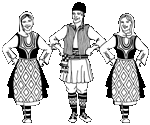 Yo soy de los Estados Unidos, nacida en Wisconsin de padres inmigrantes de Serbia (el país que anteriormente se llamaba "Yugoslavia" - a la izquiera puede ver el traje folclórico de los serbios, llamado "noshnya" o НОШЊА, usado para bailar "kolo" o КОЛО, el baile folclórico circular). Entonces me considero serbioamericana, o de etnicidad eslávica pero nacida y criada en los Estados Unidos (otros países eslávicos son Rusia, Bielorrusia, Bulgaria, Ucrania, Polonia, La República Checa, Eslovaquia, Eslovenia y Croacia). Aunque me casé hace varios años con un colombiano de apellidos Espinosa Herrera, no he cambiado mi apellido serbio: Matić (pronunciado, según las palabras inglesas, "MA-teach"). Entonces, para seguir la tradición latina de mostrar "posesión" en los apellidos de las mujeres, a veces me refiero a mí misma por el nombre de Tina Matić de Espinosa, pero mi nombre legal es Tina Matić (o, más bien, ТИНА МАТИЋ).
Yo soy de los Estados Unidos, nacida en Wisconsin de padres inmigrantes de Serbia (el país que anteriormente se llamaba "Yugoslavia" - a la izquiera puede ver el traje folclórico de los serbios, llamado "noshnya" o НОШЊА, usado para bailar "kolo" o КОЛО, el baile folclórico circular). Entonces me considero serbioamericana, o de etnicidad eslávica pero nacida y criada en los Estados Unidos (otros países eslávicos son Rusia, Bielorrusia, Bulgaria, Ucrania, Polonia, La República Checa, Eslovaquia, Eslovenia y Croacia). Aunque me casé hace varios años con un colombiano de apellidos Espinosa Herrera, no he cambiado mi apellido serbio: Matić (pronunciado, según las palabras inglesas, "MA-teach"). Entonces, para seguir la tradición latina de mostrar "posesión" en los apellidos de las mujeres, a veces me refiero a mí misma por el nombre de Tina Matić de Espinosa, pero mi nombre legal es Tina Matić (o, más bien, ТИНА МАТИЋ).
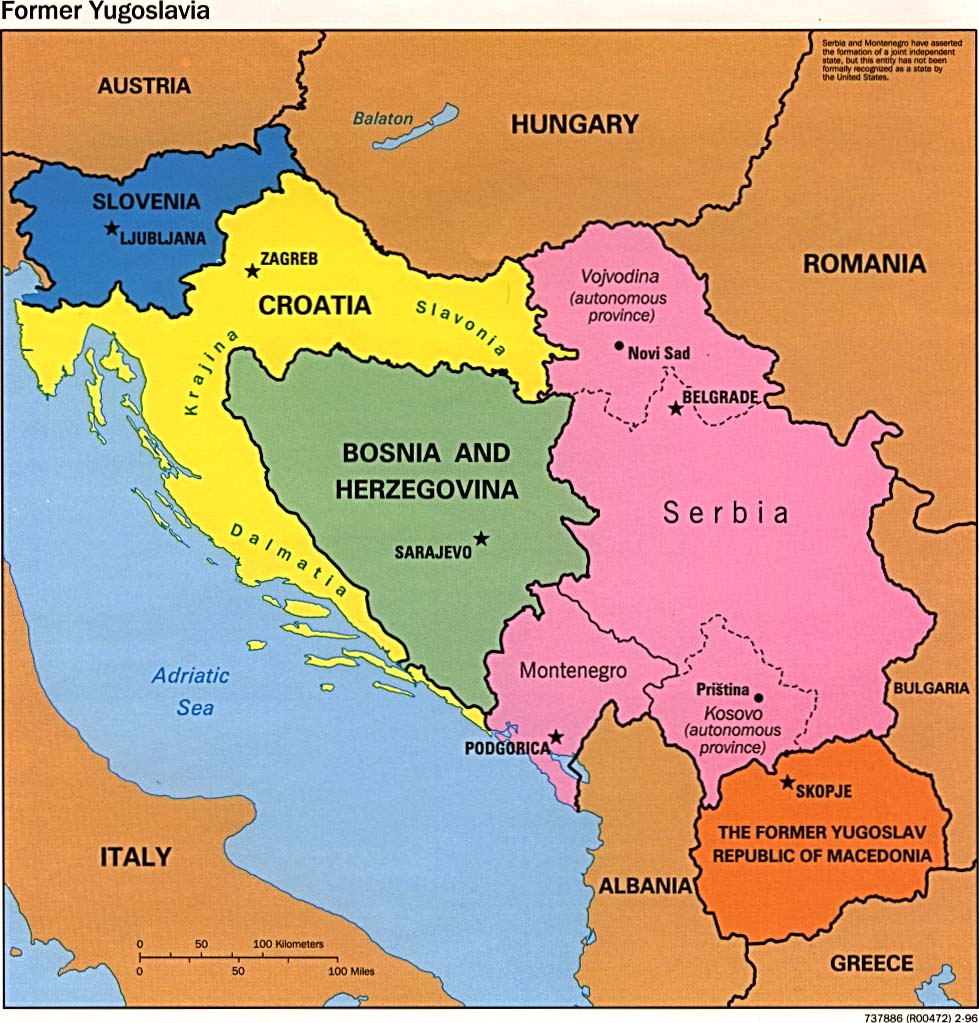
Mi nombre es Tina. Así me bautizaron, aparentemente porque eran pocas letras y fácil de deletrear (¡vaya significado!). Cuando bailaba flamenco en la UCI y en la OCC, usaba el estilo de nombre de las bailaoras flamencas y me llamaba "La Tina" en producciones y funciones de baile (para seguir los pasos de las grandes bailaoras de flamenco, como La Macarrona, La Susi y otras). Luego se me ocurrió la frase célebre que digo a mis alumnos al principio de cada año y cada vez que cometo errores, "Soy La Tina, mas no latina". Unos lo entienden de inmediato, mientras que otros toman un tiempito para que se registre esa idea.
En primer lugar, es importante comprender que "hablar" no es "ser fluido". Hablo muchos idiomas incluyendo el inglés, el español, el serbio (o, como lo llaman en el mundo académico, "serbo-croata"), el ruso y el italiano. De estos cinco idiomas algunos los he estudiado formalmente (español - más de 15 años, ruso - 2 años, italiano - 1 trimestre) y otros crecí hablándolos en casa (serbio e inglés). También hablo un poquito (muy poquito) de mandarín, coreano, japonés, tagalog, búlgaro, polaco, francés y alemán. Pero si quiere saber en cuáles de ésos me siento más segura, la respuesta es el inglés y el español. Actualmente el tercer mejor idioma mío es el serbio, el que aprendí primero en mi casa gracias a los esfuerzos de mis padres, mi familia extendida y la comunidad serbia-ortodoxa que fue gran parte de mi crianza. Si no fuera por todas esas personas, no podría haberme comunicado bien con mis abuelos (quienes hablan un poco de inglés, pero prefieren el serbio) ni con mi familia de Europa. Quisiera poder estudiar el serbio formalmente, pero no hay muchos institutos académicos que lo ofrecen (por eso estudié ruso en la UCI mientras sacaba mi licenciatura en español, porque el ruso se asemeja al serbio en su alfabeto, léxico y sintaxis). Éste es el alfabeto cirílico serbio:


Empecé a estudiarlo en la secundaria, en el séptimo año, en la escuela de Walker Junior High School con una maestra italiana (ahora jubilada), la Señora Filomena Forsyth. Me fue muy bien y me gustó mucho (tanto -o más- la maestra como -que- la clase), así que decidí seguir con el español en el colegio, en John F. Kennedy High School. Después del segundo año en KHS estando en el nivel III, me fue tan bien que mi maestro, el Señor José A. Gallegos (mexicano, todavía empleado en KHS), recomendó que saltara el cuarto nivel y que me matriculara en la clase de AP Lenguaje en mi tercer año de colegio. Tuve éxito al sacar un "3" en el examen al fin del año, pero como ése fue el nivel más alto del idioma me quedé triste sin una clase de español por el último año del colegio. Me hizo mucha falta el no estar en una clase de español, y sentí que la ausencia de la clase empeoraba bastante mi habilidad de hablar y entender el idioma ese año.
Me parece un idioma riquísimo en vocabulario (mucho más que el inglés), y eso posibilita una expresión oral y escrita muy detallada con matices y tonos intrigantes y sutiles. Por lo mismo, crea una literatura muy expresiva y rica. Los acentos de varias regiones de Latinoamérica me han llamado mucho la atención, como los de Venezuela (andino/costeño/llanero), Colombia, Argentina, Chile, Cuba y Puerto Rico. Me parece un idioma muy accesible para el angloparlante, porque existen tantos cognados y porque la gramática es sencilla (en comparación con los idiomas eslávicos). Y siendo hablante del serbio, la pronunciación del español con las vocales puras siempre ha sido fácil para mí. Al principio, se me hizo difícil la tendencia de poner el énfasis en la penúltima y/o última sílaba de las palabras como se acostumbra en español, ya que la mayoría de las palabras serbias son esdrújulas, pero después de un tiempo lo logré. El factor más grande del por qué me gusta tanto el español, creo yo, es que me divertí muchísimo al aprenderlo y me fue fácil.
Después de un año de la vida sedentaria estudiantil en la UCI, me cansé de estar tan inactiva y empecé a buscar clases de baile, ya que bailaba toda la vida en la primaria y secundaria y en funciones culturales patrocinadas por la iglesia serbio-ortodoxa.
Frequently Asked Questions
 I'm from the United States, born in Wisconsin of parents who immigrated to this country from Serbia (the country formerly called "Yugoslavia" - to the left you can see clipart of a traditional Serbian folk costume, called a "noshnya" or НОШЊА, used for dancing "kolo" or КОЛО, the folk "circle" dance). So I consider myself Serbian-American, or of Slavic ethnicity but born and raised in the U.S. (other Slavic countries are Russia, Belorusia, Bulgaria, the Ukraine, Poland, the Chec Republic, Slovakia, Slovenia, and Croatia). Though I've been married for various years to a Colombian with the last names Espinosa Herrera, I haven't changed my Serbian last name: Matić (pronounced like the English words "MA-teach"). Sometimes I refer to myself as Tina Matić de Espinosa (Latin-style last name, which is the maiden name followed by "de" and the husband's first surname) but my legal name remains Tina Matić (or, rather, ТИНА МАТИЋ).
I'm from the United States, born in Wisconsin of parents who immigrated to this country from Serbia (the country formerly called "Yugoslavia" - to the left you can see clipart of a traditional Serbian folk costume, called a "noshnya" or НОШЊА, used for dancing "kolo" or КОЛО, the folk "circle" dance). So I consider myself Serbian-American, or of Slavic ethnicity but born and raised in the U.S. (other Slavic countries are Russia, Belorusia, Bulgaria, the Ukraine, Poland, the Chec Republic, Slovakia, Slovenia, and Croatia). Though I've been married for various years to a Colombian with the last names Espinosa Herrera, I haven't changed my Serbian last name: Matić (pronounced like the English words "MA-teach"). Sometimes I refer to myself as Tina Matić de Espinosa (Latin-style last name, which is the maiden name followed by "de" and the husband's first surname) but my legal name remains Tina Matić (or, rather, ТИНА МАТИЋ).

My name is Tina. That's how I was baptized. When I used to dance Flamenco at UCI and OCC, I used the Spanish style of stage name in shows and performances and called myself "La Tina" (following in the footsteps of other famous dancers, such as La Macarrona, La Susi, and others). Then I came up with the famous phrase I tell my students at the beginning of each school year and whenever I make mistakes in Spanish or don't know a cultural fact, "Soy La Tina, mas no latina". Some people understand it right away, while others take some time for the idea to register.
In the first place, it's important to understand that "speak" does not mean "have fluency in". I speak many languages including English, Spanish, Serbian (or, as they call it in the Academic world, "Serbo-Croatian"), Russian, and Italian. Of these five languages, I have formerly studied some (Spanish - 17 years, Russian - 2 years, Italian - 1 quarter) and others I grew up speaking at home (Serbian and English). I also speak a little (very little) Mandarin, Korean, Japanese, Tagalog, Bulgarian, Polish, French, and German. But if you want to know in which of these I feel most confident, the answer is English and Spanish. Currently the third-best language I speak is Serbian, which was the first language I learned at home thanks to the efforts of my parents, my extended family, and the Serbian Orthodox community that was a large part of my upbringing. If it weren't for all of these people, I wouldn't have been able to communicate well neither with my grandparents (who speak a little English, but prefer Serbian) nor with my family in Europe. I would like to be able to study Serbian formally, but there aren't many academic institutes that offer the language (which is why I studied Russian at UCI while I was getting a bachelor's degree in Spanish, since Russian is similar to Serbian in its alphabet, lexicon and syntaxis). This is the Serbian Cyrillic alphabet:


I started to study it in junior high (7th grade) at Walker Jr. High School with my teacher (now retired), Mrs. Filomena Forsyth (Italian). I did well and I enjoyed it a lot (as much -or more- the teacher as -than- the class), so I decided to continue with Spanish in high school, at John F. Kennedy High School. After the second year at KHS while in level III, I did so well that my teacher, Mr. José A. Gallegos (Mexican, still teaching at KHS), recommended that I skip the IV level and enroll in the AP Language class in my third year of high school. I had success earning a "3" on the exam at the end of the year, but since that was the highest level of the language I was sad to not take a Spanish class during my last year of high school. I missed practicing the language every day and felt that my language ability was deteriorating, especially speaking and understanding oral Spanish.
I think it's a language that is very rich in vocabulary (much more so than English), and this makes it possible to have oral and written expression that is detailed and that has subtle and fascinating nuances and tones. For these same reasons, it provides a very rich and expressive literature. The regional Latin American accents have always interested me a lot, like those from Venezuela (Andean/coastal/plains), Colombia, Argentina, Chile, Cuba, and Puerto Rico. I think it is a very accesible language for the English speaker, because there are so many cognates and because the grammar is simple (in comparison to Slavic languages). And being a speaker of Serbian, the pronounciation of Spanish with its pure vowels has been easy for me. In the beginning, it was hard for me to put the correct stress on words because most Serbian words have the stress on the antipenultimate syllable while Spanish stress usually falls on the penultimate and the last syllables, but after a while I got it. The biggest factor for why I like Spanish, I think, is because I had a lot of fun learning it and it was easy for me.
After a year of a sedentary life style at UCI, I got tired of being inactive and started to look for dance classes, since I danced all my life in school and in cultural shows and events sponsored by the Serbian Orthodox church.
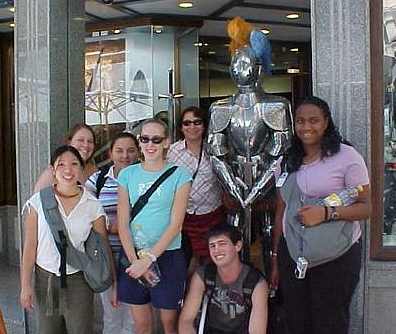

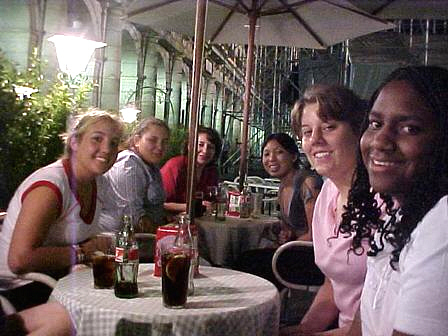
(Click fotos to enlarge! Left to right - Toledo, Granada, Madrid; below - our group T-shirt, in red & blue)
Oxford Academy Trip to Spain in 2004
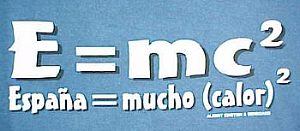
Our group shirt... the students' were red... ¡y ole!

